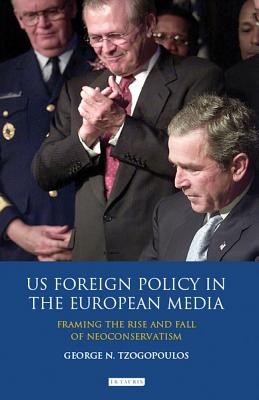
- We will send in 10–14 business days.
- Author: George N Tzogopoulos
- Publisher: I. B. Tauris & Company
- Year: 2012
- Pages: 256
- ISBN-10: 1848856032
- ISBN-13: 9781848856035
- Format: 14 x 21.6 x 2.5 cm, hardcover
- Language: English
- SAVE -10% with code: EXTRA
Reviews
Description
After 9/11, neoconservatism was widely regarded as the dominant political ideology informing US foreign policy - particularly by the press. George N. Tzogopoulos here argues that the impact of neoconservatism can be disputed, examining other factors which influenced US foreign policy and the role of other politicians outside the neoconservatism movement. He demonstrates that prior to the events of 9/11, the key opinion-forming newspapers in Europe differed in their representations of neoconservatism. But, after 9/11, the European press rapidly adopted very similar approaches, constructing neoconservatism as the driving force behind Bush's international politics approach and the war on Iraq. The author asks why it is that media coverage in Europe focused on neoconservatism in particular over other IR theories, and the different factors - such as the scapegoat theory - which influenced journalistic work. He also examines early indications of the ways in which the European media are portraying US foreign policy under the Obama administration. This is an important contribution to our understanding of the dynamic between International Relations and the news media.
EXTRA 10 % discount with code: EXTRA
The promotion ends in 20d.14:10:39
The discount code is valid when purchasing from 10 €. Discounts do not stack.
- Author: George N Tzogopoulos
- Publisher: I. B. Tauris & Company
- Year: 2012
- Pages: 256
- ISBN-10: 1848856032
- ISBN-13: 9781848856035
- Format: 14 x 21.6 x 2.5 cm, hardcover
- Language: English English
After 9/11, neoconservatism was widely regarded as the dominant political ideology informing US foreign policy - particularly by the press. George N. Tzogopoulos here argues that the impact of neoconservatism can be disputed, examining other factors which influenced US foreign policy and the role of other politicians outside the neoconservatism movement. He demonstrates that prior to the events of 9/11, the key opinion-forming newspapers in Europe differed in their representations of neoconservatism. But, after 9/11, the European press rapidly adopted very similar approaches, constructing neoconservatism as the driving force behind Bush's international politics approach and the war on Iraq. The author asks why it is that media coverage in Europe focused on neoconservatism in particular over other IR theories, and the different factors - such as the scapegoat theory - which influenced journalistic work. He also examines early indications of the ways in which the European media are portraying US foreign policy under the Obama administration. This is an important contribution to our understanding of the dynamic between International Relations and the news media.


Reviews